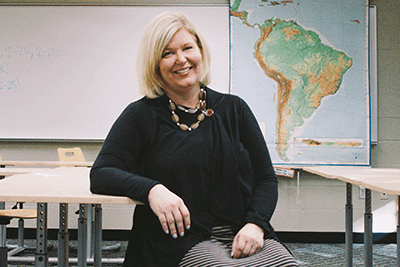January 7, 2022
 How many years have you been at MPA?
How many years have you been at MPA?
This is my 22nd year at MPA (32nd year of teaching).
What do you love about MPA?
I love how the school embraces all academic areas as “essential.” Our students are effortlessly interdisciplinary in how they understand the world around them. I see it in my students in class and in my children at home, and every time, I am amazed and impressed.
How does MPA inspire students who dream big and do right?
MPA students have opportunities to go beyond the MPA curriculum through programs like the Graduate Certificates of Distinction and the Malone Online Schools Network. The liberal arts curriculum builds from the solid foundation of the Middle and Lower schools to very advanced classes in the content areas. Students are able to achieve excellence in their passions that they can carry beyond our school.
If you have worked at another school, how has your experience at MPA been different?
An MPA education is relationship based. The students are able to learn deeply because they are able to speak up in class, to get immediate, oral feedback, to ask questions, to question ideas, and especially to chat informally about what matters to them and what they find interesting. Additionally, they interact with the whole of the student body in classes, hallways, gyms, stages, and common areas both socially and intellectually. That is to say that student groupings are fluid both in their make-up and the types of interactions they have. I work with seniors on their senior speeches and, to a person, they thank their peers for the interesting, diverse and compassionate classroom discussions they have shared.
What would you tell a parent considering MPA?
If you have the ability to give your child the chance to develop into the person they have the potential to be, why would you not do it? The deep and broad education at MPA enables students to flourish– whether that be through creative writing, reciting poetry, building robots, debating issues, performing on a stage, playing multiple sports, designing costumes, solving complex equations, fully learning a language/languages, or becoming a citizen scientist.
In what ways are you preparing students for life in the 21st century?
The future is going to require citizens who are flexible and nimble. By basing one’s knowledge and passions on a broad, liberal-arts education, MPA students will be able to adapt to a changing future and possibly even be leaders in those changes. Our language department is committed to the idea that we will better understand our fellow humans through the study of language and culture. The world will only get smaller. Understanding people from different cultures, our languages, practices and values will help us to all get along better.
What do you hope for MPA students in 20 years?
I hope that they continue to be critical learners. That is, I hope that they are flexible enough to continue to adapt and change and learn, while simultaneously able to think critically about the value of those changes.
Is there anything else you’d like to share about your MPA experience?
MPA offers students every opportunity to learn, grow and flourish. All any student has to do is grab those opportunities.